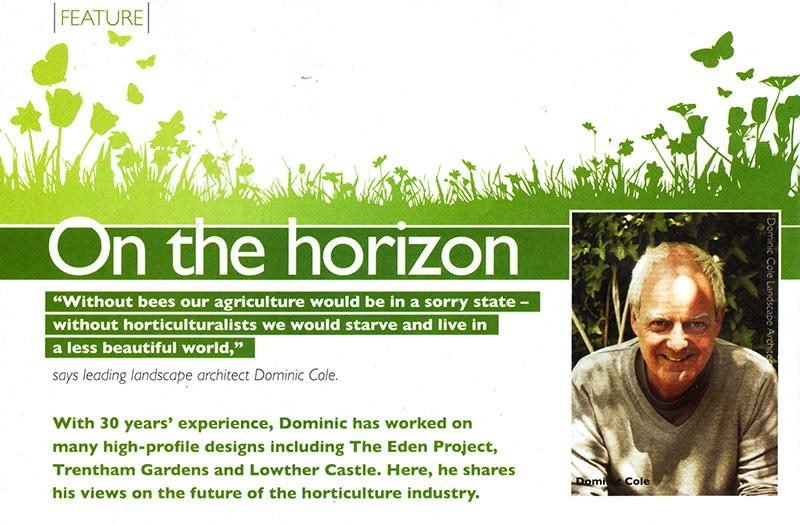
“Without bees our agriculture would be in a sorry state -without horticulturalists we would starve and live in a less beautiful world,” says leading landscape. architect Dominic Cole.
With 30 years’ experience, Dominic has worked on many high-profile designs including The Eden Project, Trentham Gardens and Lowther Castle. Here, he shares his views on the future of the horticulture industry.
Funding for projects like Eden is scarce nowadays. Can a landscape architect who wants to work sustainably still forge a career?
I am from a generation who consider the primary client of any job to be the environment. I have a reluctance to use irreplaceable natural resources. There is plenty of scope for landscape architects to work with the environment and to practise good housekeeping and good husbandry. A tightened economy should trigger an informed and intelligent approach to how we use our environment and its resources – and how we should nurture our habitat.
Why have you become actively involved in helping to build skills within horticulture?
I always feel proud to share the success of any scheme with the people who actually make it happen: contractors; horticulturalists and gardeners. It is demeaning when these expert professionals are not recognised for their experience and skill, equal to that of any good designer. Making The Eden Project happen required an immense range of dedicated people – from soil scientists, hydrologists and earthworks contractors to the team of horticulturalists who raised many of the plants from seed. However, while horticulture as a career is still considered a dumping ground we cannot hope to inspire people into the profession.
So what can we do to attract more young people into horticulture?
It is vital to raise awareness about what a diverse profession horticulture can be, offering openings for a wide range of skills and abilities. As Chairman of the Garden History Society, I have had the privilege of giving presentations to colleges of horticulture using garden history as my theme. I am able to draw on 30 years of working in fantastic gardens for English Heritage, the National Trust, private owners and some of our towns’ best green places – every site I have worked on needs a gardener! Showing students the range of places they may be able to work in is always fun, but it is just one strand of horticulture as a profession.
What would your hopes for the future of horticulture be?
There is definitely a need for the status of horticulture to be brought onto an equal footing with other established industries. Because gardening is an ancient skill, everyone believes anybody can garden. There is some way to go
to convince people that real learning, training and skills are needed to understand and practise horticulture and anyone involved should be properly recognised and rewarded.
For more about the wealth of careers available in horticulture visit: www.growcareers.info/
